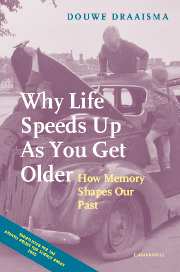Book contents
- Frontmatter
- Contents
- List of illustrations
- Acknowledgments
- 1 ‘Memory is like a dog that lies down where it pleases’
- 2 Flashes in the dark: first memories
- 3 Smell and memory
- 4 Yesterday's record
- 5 The inner flashbulb
- 6 ‘Why do we remember forwards and not backwards?’
- 7 The absolute memories of Funes and Sherashevsky
- 8 The advantages of a defect: the savant syndrome
- 9 The memory of a grandmaster: a conversation with Ton Sijbrands
- 10 Trauma and memory: the Demjanjuk case
- 11 Richard and Anna Wagner: forty-five years of married life
- 12 ‘In oval mirrors we drive around’: on experiencing a sense of déjà vu
- 13 Reminiscences
- 14 Why life speeds up as you get older
- 15 Forgetting
- 16 ‘I saw my life flash before me’
- 17 From memory – Portrait with Still Life
- Index of names
13 - Reminiscences
Published online by Cambridge University Press: 22 September 2009
- Frontmatter
- Contents
- List of illustrations
- Acknowledgments
- 1 ‘Memory is like a dog that lies down where it pleases’
- 2 Flashes in the dark: first memories
- 3 Smell and memory
- 4 Yesterday's record
- 5 The inner flashbulb
- 6 ‘Why do we remember forwards and not backwards?’
- 7 The absolute memories of Funes and Sherashevsky
- 8 The advantages of a defect: the savant syndrome
- 9 The memory of a grandmaster: a conversation with Ton Sijbrands
- 10 Trauma and memory: the Demjanjuk case
- 11 Richard and Anna Wagner: forty-five years of married life
- 12 ‘In oval mirrors we drive around’: on experiencing a sense of déjà vu
- 13 Reminiscences
- 14 Why life speeds up as you get older
- 15 Forgetting
- 16 ‘I saw my life flash before me’
- 17 From memory – Portrait with Still Life
- Index of names
Summary
The eighty years of the life of Willem van den Hull, reduced to about as many words, go as follows. He was born in 1778 in Haarlem, the son of a postman. With the financial support of some well-to-do Haarlem citizens he trained as a schoolmaster and later became the owner of an independent boarding school. He did so well that he was able to found a ‘French school’ in Haarlem's grandest building, where many members of the Amsterdam aristocracy had their sons educated. He remained single and with his spinster sister brought up his nephew Hubert as his own son. Van den Hull died in 1858.
That we know so much more about his life than these simple facts is thanks to his voluminous autobiography. Van den Hull began work on it in 1841. At the time he was sixty-three, had retired as head of his boarding school and had all the leisure he needed to chronicle his life. In little more than a year, he had described his life up to the age of thirty-seven. When he was sixty-five he wrote a second instalment devoted to his life until 1854. He lived for another four years, but left no further autobiographical records. The full text runs to precisely eight hundred numbered pages in unbound sections, with some four hundred words to each page, written in a neat school master's hand.
The text was probably not meant for publication.
- Type
- Chapter
- Information
- Why Life Speeds Up As You Get OlderHow Memory Shapes our Past, pp. 172 - 200Publisher: Cambridge University PressPrint publication year: 2004



